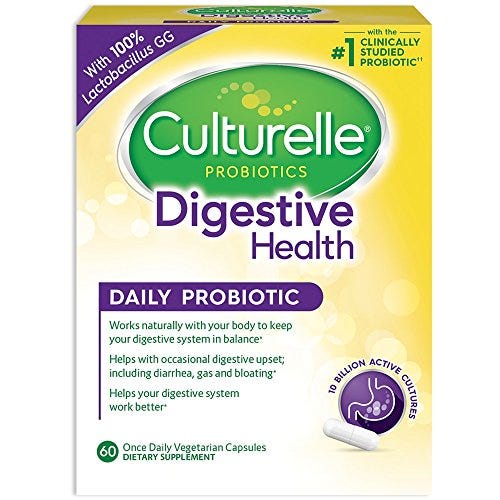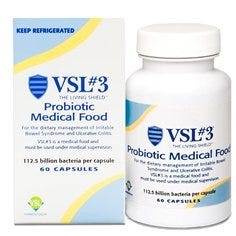Home » Diet & Food »
The Best Probiotic Foods And Supplements For Weight Loss

Taking probiotics for your gut health is one thing. (Who’s gonna say no to fewer stomach issues and more bathroom regularity? No one—that’s who.)
But can these teeny-tiny bacteria—found in dietary supplements and fermented foods—help you lose weight, too? They do live in your stomach, after all.
First: What the heck are probiotics anyway?
Probiotics are live microorganisms that naturally live in your body already, according to the National Center for Complementary and Integrative Health.

“Probiotics are substances that encourage the growth of bacteria, specifically beneficial bacteria, that help to keep intestinal health in balance,” says Frances Largeman-Roth, R.D.N., author of Eating in Color. “A healthy balance of good bacteria in the body may help regulate weight and ward off a range of health issues.”
So, can probiotics help with weight loss?
Honestly, no one knows for sure—that’s because most probiotic research has focused on how they can improve digestive issues or immune health.
The most promising evidence on probiotics and weight loss comes from a 2013 study in The British Journal of Nutrition, which studied the effects of one strain of probiotics, lactobacillus rhamnosus (LGG).

Researchers followed 125 men and women throughout a 12-week weight-loss program, giving half the participants LGG and the other half a placebo. At the end of the trial, the women who took probiotics lost more weight than the women on the placebo. The probiotics group also went on to continue losing weight after the trial had ended (the placebo group only maintained).
The bad news? This is pretty much the only study of its kind—all the others have used much smaller sample sizes.
Still, probiotics promote overall health, which never hurts when it comes to weight loss. “Gut bacteria lines the intestines and comes in contact with the food you eat, [so] the thought is that this may impact how you absorb nutrients,” says Amy Gorin, R.D.N., owner of Amy Gorin Nutrition in the New York City area.
How can I add more probiotics to my diet?
“I would always urge people to eat food first, but if probiotic-offering foods—such as yogurt and unpasteurized sauerkraut—aren’t a daily part of your diet, I’d suggest taking a supplement,” says Gorin.
But remember: A healthy gut won’t guarantee weight loss. “Probiotics alone won’t make you lose weight, but they are certainly part of the puzzle,” says Largeman-Roth. In other words, it couldn’t hurt to do the following:
1. Stock up on yogurt.
Fermented dairy products, like yogurt and kefir, are high in the lactobacillus probiotic.
“Not all yogurt contains probiotics, so it’s important to read the label and visit the company’s website to look for transparency about this,” says Gorin.(Hint: look for the National Yogurt Association’s “Live & Active Cultures” seal. Chobani and Fage brands are typically safe bets.)

If you would rather drink your dairy than eat it with a spoon, you can try kefir, a fermented drink made from cow’s or goat’s milk and cultures of yeast and lactic acid bacteria.
2. Load up on picked cabbage.
Like yogurt and kefir, vegetables that are fermented—especially pickled cabbage, like sauerkraut and kimchi—are reliable ways to pump up your probiotic ratio.
One caveat about pickled cabbage: most of the products sold in U.S. stores have been through a heating process called pasteurization for safety, which can destroy both good and bad bacteria. So, if you really want to rep the fermentation benefits, look for unpasteurized products or make your own.
3. Try out some probiotic supplements—but be picky.
There are dozens of probiotic supplements on the market, but different supplements contain different strains and some may not be associated with overall gut health.

Culturelle specifically advertises that it uses the LGG strain (previously studied for its relationship to weight loss), and Gorin also recommends Florastor for helping to promote healthy gut bacteria.
VSL#3 is another probiotic supplement that’s more potent than most (it contains eight different strains of live bacteria). It’s most often prescribed along with certain medications to manage chronic digestive issues like irritable bowel syndrome and ulcerative colitis.
Gorin notes that one study in Obesity found daily supplementation with VSL#3 may provide some protection against weight gain when eating a high-calorie, high-fat diet. However, the sample size was limited: only 20 non-obese men were studied.
Of course, don’t forget to hit up your doctor for the go-ahead before taking any supplements.
Source: Read Full Article



